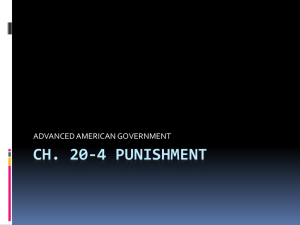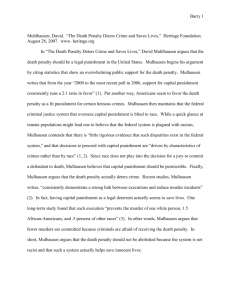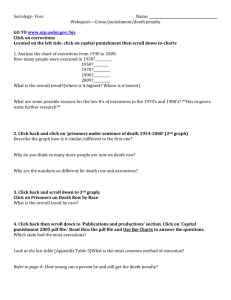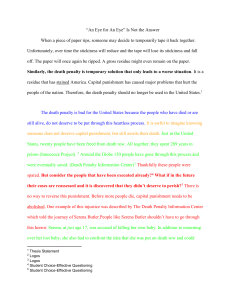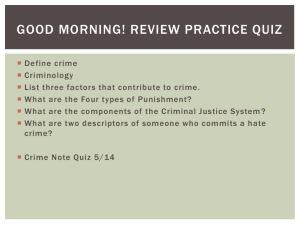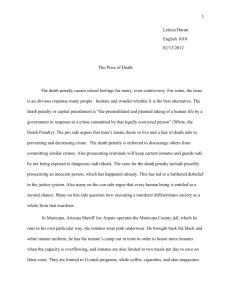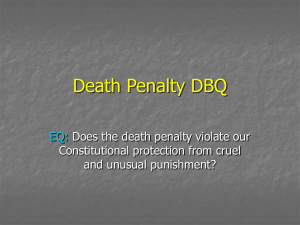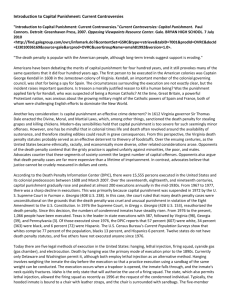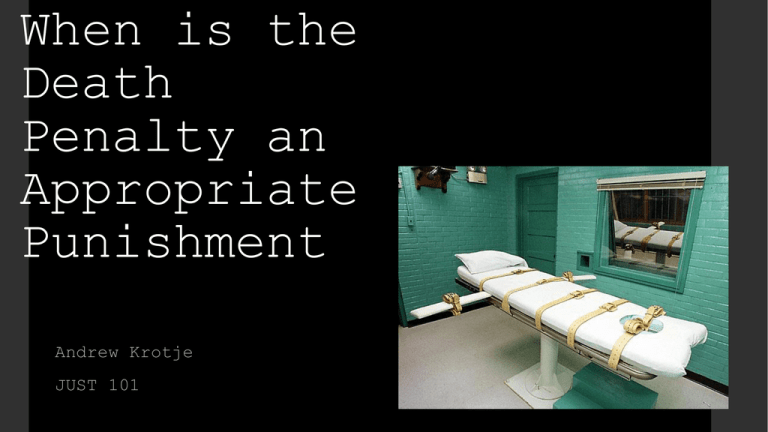
When is the
Death
Penalty an
Appropriate
Punishment
Andrew Krotje
JUST 101
Types of Crimes
•
Felony
More than a year in jail
Includes: murder, rape,
kidnapping, armed robbery,
grand theft
•
Misdemeanor
12 months or less in jail
Includes: simple assault,
disorderly conduct, DUI/DWI,
domestic violence, theft,
trespassing, vandalism
•
Infraction
Usually punishable by fines
with no jail time.
Breaking local laws or
ordinances. i.e. speeding,
disposal of garbage, antinoise ordinances
•
Capital Crimes
Serious felonies
Ultimate penalty can be placed
Life sentences or execution
Types of Capital
Punishment
•
Lethal Injection
•
Gas Chamber
Hydrochloric acid flows into a pan behind the
chair. Then a quantity of potassium cyanide or
sodium cyanide crystals is added into the acid.
A few seconds after the inmate takes a breath,
their ability to process blood hemoglobin and
causes unconsciousness. Within 5-15 minutes
they are pronounced dead. If the inmate holds
their breath they can cause problems resulting
in convulsions.
Most common form of Capital Punishment.
Intravenous delivery of a deadly
quantity of three different drugs. The
drugs are (in order of delivery): sodium
• Hanging
thiopental (causing unconsciousness),
A specific amount of force must be applied to
pancuronium bromide (paralyzing the
the neck in relation to the weight of the
lungs and diaphragm), and potassium
inmate. Done correctly, dislocation of the
chloride (causing fatal cardiac arrest).
third or fourth cervical vertebrae will occur.
Takes approximately 7 minutes.
The noose is placed behind the inmates left
•
Electrocution
ear.
Not done correctly, the inmate will strangle to
death, die from lack of blood to the brain, or
cause decapitation if dropped too far.
Direct application of electric current.
Between 1,500 to 2,250 volts for 30
seconds to a minute. Followed by
• Firing Squad
alternating voltages of varying
intensities for another minute.
A team of five shooters. Some have real
bullets while others have blanks.
Commonly results in the smell of burning
The team aims for a target placed on the heart
skin and the possibility of flesh
catching on fire.
The shooters all fire at the same time.
•
•
•
•
•
•
•
•
•
•
•
•
•
•
•
•
•
•
•
•
States with Most Common form
of Capital Punishment:
Alabama
Arizona
Arkansas
California
Colorado
Delaware
Florida
Georgia
Idaho
Indiana
Kansas
Kentucky
Louisiana
Mississippi
Missouri
Montana
Nevada
New Hampshire
North
Carolina
•
•
•
•
•
•
•
•
•
•
•
•
Ohio
Oklahoma
Oregon
Pennsylvania
South Carolina
South Dakota
Tennessee
Texas
Utah
Virginia
Washington
Wyoming
•
Federal
Types of Capital
Punishment(cont.)
Conditions of Use
•
Appropriate Crimes:
Murder is the most common cause
for the death penalty.
Can be for rape or kidnapping
depending on circumstances of the
crime along with other factors.
•
Uses:
•
•
•
Deterrent
• Inhibit criminal
behavior through fear of
punishment
Incapacitation
• Reduce the possibility
of the criminal to
commit another crime
ever again.
Retribution
• Revenge on a criminal
perpetrator.
•
Why it Should Not Be Used:
Innocence
311 post-conviction DNA exonerations
Wrongful Convictions
Eyewitness Misidentification Testimony
Unvalidated or Improprer Forensic Science
False Confessions and Incriminating
Statements
Informants
Inadequate Legal Representation
Police and Prosecutorial Misconduct
Perjured Testimony
Racial Prejudice
Jailhouse “snitch” Testimony
Suppression and/or Misinterpretation of
Mitigating Evidence
Community and/or Political Pressure to Solve
a Case
Mental Illness
Alternative Sentencing
Life without Parole
Appropriateness of Sentence
•
Factors:
Aggravating Factors: any
relevant circumstances,
supported by the evidence
presented during the trial,
that makes the harshest
penalty appropriate, in the
judgment of the jurors.
Mitigating Factors: any
evidence presented regarding
the defendant’s character or
the circumstances of the
crime, which would cause a
juror to vote for a lesser
sentence.
•
Examples of these factors:
The presence or absence of violent
criminal activity by the defendant.
The presence or absence of any prior
felony convictions.
If the crime was committed while the
defendant was under the influence of
extreme mental or emotional
disorders.
If the victim was a participant in
the defendant’s homicidal conduct or
if the victim consented to the
killing.
If the crime was committed under
belief of moral justification.
If the defendant acted under extreme
duress or substantial domination of
another person.
The age of the defendant at the time
of the crime.
If the defendant was an accomplice
and if their involvement was
relatively minor.
The Death Penalty Today
States with the Death Penalty
•
Alabama
•
Louisiana
•
Arizona
•
Mississippi
•
•
•
•
•
•
•
•
•
•
Arkansas
California
Colorado
Delaware
Florida
Georgia
•
•
•
•
•
•
•
South
Carolina
States without the Death Penalty
and Year Abolished
•
Alaska (1957)
•
North Dakota (1973)
•
Connecticut (2012)
•
Rhode Island (1984)
•
Hawaii (1957)
•
Vermont (1964)
•
Illinois (2011)
•
West Virginia (1965)
•
Wisconsin (1853)
•
D.C. (1981)
•
South Dakota
•
Tennessee
•
Texas
•
Iowa (1965)
•
Utah
•
Maine (1887)
•
Virginia
•
Maryland (2013)
•
Washington
•
Massachusetts (1984)
•
Wyoming
•
Michigan (1846)*
•
Minnesota (1911)
•
New Jersey (2007)
•
New Mexico (2009)
•
New York (2007)
Missouri
Montana
Nebraska
Nevada
New Hampshire
North
Carolina
Idaho
•
Ohio
•
Oklahoma
Indiana
•
U.S. Gov’t
Kansas
•
Oregon
•
Pennsylvania
Kentucky
•
U.S. Military
*-First state to
abolish the Death
Penalty
The Death Penalty Today(Cont.)
•
Most Recent Death Penalty
Execution:
Jerry Martin (Volunteer)
Executed December 3, 2013
Place of Execution: Texas
Method Used: Lethal Injection
Reason for Sentence: Murder of
a correctional officer after
escaping prison.



